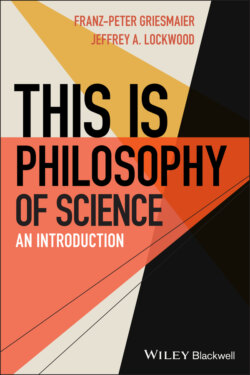Читать книгу This is Philosophy of Science - Franz-Peter Griesmaier - Страница 41
3.3 The Demarcation Problem
ОглавлениеTo be honest, we have simplified Popper’s position to a considerable extent in order to introduce the notion of falsification. His actual view is much more sophisticated. To see this, consider a famous problem that motivated much of early twentieth-century work in the philosophy of science: the so-called demarcation problem, which is the problem of distinguishing empirical science from various forms of pseudoscience. For a group of philosophers known as logical positivists (a.k.a. logical empiricists), pseudoscience included metaphysics. The positivists sought to draw the distinction in terms of meaningfulness, which in turn was assessed by the verifiability of statements. For example, the statement, “The absolute is beautiful” sounds at first glance meaningful; after all, it is a grammatically well-formed sentence in English. But what exactly does it say? The positivists thought that if a statement has meaning, you should be able to determine whether it is true or false. If you can’t, the statement is meaningless. Now, is it true that the absolute is beautiful? How would you verify it? If you think that this statement can’t be verified, because you don’t know, e.g., where to find the absolute to see whether it is indeed beautiful, then you should conclude, so the positivists contended, that it is meaningless. Of course, you might find the statement evocative, or it might resonate with you on an aesthetic level, and so have some sort of meaning. But what it lacks, according to the positivists, is cognitive meaning. Real science consists of statements that are cognitively meaningful, i.e., can be verified. This view has become known as the verifiability theory of cognitive meaningfulness.
Unfortunately, the verifiability criterion is too strong and rules out a lot of science. Consider again the claim that all ravens are black. We have seen earlier that to confirm this seems hopeless; verifying it is outright impossible, because you’d have to inspect all ravens past, present, and future. By the verifiability criterion for meaningfulness, the claim that all ravens are black is therefore meaningless. But that seems wrong. While “The absolute is beautiful” is rather obviously meaningless, “All ravens are black” is not. However, both are unverifiable. Thus, verifiability is the wrong criterion for distinguishing the meaningful from the meaningless.
Popper agreed with the positivists on the importance of distinguishing genuine science from pseudoscientific babble, but he didn’t think that taking a detour through a criterion for meaningfulness was the right approach. So he opted for falsification instead. “All ravens are black” can be falsified, while “The absolute is beautiful” can’t be. You can, in principle, find at a raven that’s not black, but you can’t find the absolute and see that it’s ugly. Thus, the first statement belongs to science, while the second one doesn’t, whether meaningful or not.
